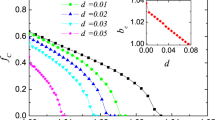Abstract
We study the evolution of cooperation in structured populations within popular models of social dilemmas, whereby simple coevolutionary rules are introduced that may enhance players abilities to enforce their strategy on the opponent. Coevolution thus here refers to an evolutionary process affecting the teaching activity of players that accompanies the evolution of their strategies. Particularly, we increase the teaching activity of a player after it has successfully reproduced, yet we do so depending on the disseminated strategy. We separately consider coevolution affecting either only the cooperators or only the defectors, and show that both options promote cooperation irrespective of the applied game. Opposite to intuitive reasoning, however, we reveal that the coevolutionary promotion of players spreading defection is, in the long run, more beneficial for cooperation than the likewise promotion of cooperators. We explain the contradictive impact of the two considered coevolutionary rules by examining the differences between resulting heterogeneities that segregate participating players, and furthermore, demonstrate that the influential individuals completely determine the final outcome of the games. Our findings are immune to changes defining the type of considered social dilemmas and highlight that the heterogeneity of players, resulting in a positive feedback mechanism, is a fundamental property promoting cooperation in groups of selfish individuals.
Similar content being viewed by others
References
M.W. Macy, A. Flache, Proc. Natl. Acad. Sci. USA 99, 7229 (2002)
B. Skyrms, The Stag Hunt and the evolution of Social Structure (Cambridge Univ. Press, Cambridge, UK, 2003)
R. Axelrod, Evolution of Cooperation (Basic Books, New York, 1984)
J. Maynard Smith, Evolution and the Theory of Games (Cambridge University Press, Cambridge, 1982)
J. Hofbauer, K. Sigmund, Evolutionary Games and Population Dynamics (Cambridge University Press, Cambridge, 1988)
H. Gintis, Game Theory Evolving (Princeton University Press, Princeton, 2000)
M.A. Nowak, Evolutionary Dynamics: Exploring the Equations of Life (Harvard University Press, Harvard, 2006)
M. Milinski, J.H. Lüthi, R. Eggler, G.A. Parker, Proc. R. Soc. B 264, 831 (1997)
P.E. Turner, L. Chao, Nature 398, 441 (1999)
M.A. Nowak, R.M. May, Nature 359, 826 (1992)
K. Lindgren, M.G. Nordahl, Physica D 75, 292 (1994)
F. Schweitzer, L. Behera, H. Mühlenbein, Adv. Complex Systems 5, 269 (2002)
C. Hauert, M. Doebeli, Nature 428, 643 (2004)
F.C. Santos, J.M. Pacheco, Phys. Rev. Lett. 95, 098104 (2005)
F.C. Santos, J.M. Pacheco, T. Lenaerts, Proc. Natl. Acad. Sci. USA 103, 3490 (2006)
J.M. Pacheco, A. Traulsen, M.A. Nowak, Phys. Rev. Lett. 97, 258103 (2006)
A. Szolnoki, M. Perc, New J. Phys. 10, 043036 (2008)
W.-X. Wang, J. Lu, G. Chen, P.M. Hui, Phys. Rev. E 77, 046109 (2008)
H. Fort, Europhys. Lett. 81, 48008 (2008)
G. Abramson, M. Kuperman, Phys. Rev. E 63, 030901(R) (2001)
H. Ebel, S. Bornholdt, Phys. Rev. E 66, 056118 (2002)
Z.-X. Wu, X.-J. Xu, Y. Chen, Y.-H. Wang, Phys. Rev. E 71, 037103 (2005)
M. Tomassini, L. Luthi, M. Giacobini, Phys. Rev. E 73, 016132 (2005)
G. Szabó, J. Vukov, A. Szolnoki, Phys. Rev. E 73, 067103 (2006)
J. Poncela, J. Gómes-Gardeñes, L.M. Floría, Y. Moreno, New J. Phys. 9, 184 (2007)
W.-X. Wang, J. Ren, F. Qi, Phys. Rev. E 75, 045101 (2007)
N. Masuda, Proc. R. Soc. B 274, 1815 (2007)
Z. Rong, X. Li, X. Wang, Phys. Rev. E 76, 027101 (2007)
X. Chen, L. Wang, Phys. Rev. E 77, 017103 (2008)
A. Szolnoki, M. Perc, G. Szabó, Eur. Phys. J. B 61, 505 (2008)
J. Vukov, G. Szabó, A. Szolnoki, Phys. Rev. E 77, 026109 (2008)
G. Szabó, G. Fáth, Phys. Rep. 446, 97 (2006)
B.-J. Kim, A. Trusina, P. Holme, P. Minnhagen, J.S. Chung, M.Y. Choi, Phys. Rev. E 66, 021907 (2002)
Z.X. Wu, X.J. Xu, Z.G. Huang, S.J. Wang, Y.H. Wang, Phys. Rev. E 74, 021107 (2006)
X. Chen, F. Fu, L. Wang, T. Chu, arXiv:physics/0701317 (2007)
J.-Y. Guan, Z.-X. Wu, Y.-H. Wang, Phys. Rev. E 76, 042102 (2007)
A. Szolnoki, G. Szabó, Europhys. Lett. 77, 30004 (2007)
M. Perc, New J. Phys. 8, 22 (2006)
M. Perc, Phys. Rev. E 75, 022101 (2007)
J. Tanimoto, Phys. Rev. E 76, 041130 (2007)
M. Perc, A. Szolnoki, Phys. Rev. E 77, 011904 (2008)
J.M. Pacheco, A. Traulsen, M.A. Nowak, J. Theor. Biol. 243, 43 (2006)
J. Poncela, J. Gómes-Gardeñes, L.M. Floría, A. Sánchez, Y. Moreno, PLoS One 3, e2449 (2008)
E. Pestelacci, M. Tomassini, L. Luthi, Biological Theory 3, 139 (2008)
M.G. Zimmermann, V.M. Eguíluz, M. San Miguel, Phys. Rev. E 69, 065102(R) (2004)
V.M. Eguíluz, M.G. Zimmermann, C.J. Cela-Conde, M. San Miguel, Am. J. Soc. 110, 977 (2005)
M. Perc, New J. Phys. 8, 183 (2006)
G. Szabó, C. Tőke, Phys. Rev. E 58, 69 (1998)
A. Traulsen, M.A. Nowak, J.M. Pacheco, J. Theor. Biol. 244, 349 (2007)
A. Traulsen, N. Shoresh, M.A. Nowak, Bull. Math. Biol. 70, 1410 (2008)
M.E.J. Newman, arXiv:0809.0522
C.P. Roca, J.A. Cuesta, A. Sánchez, Phys. Rev. Lett. 97, 158701 (2006)
A. Szolnoki, M. Perc, Z. Danku, Physica A 387, 2075 (2008)
F.C. Santos, J.M. Pacheco, J. Evol. Biol. 19, 726 (2006)
F.C. Santos, J.F. Rodrigues, J.M. Pacheco, Proc. R. Soc. Lond. B 273, 51 (2006)
Author information
Authors and Affiliations
Corresponding author
Rights and permissions
About this article
Cite this article
Szolnoki, A., Perc, M. Promoting cooperation in social dilemmas via simple coevolutionary rules. Eur. Phys. J. B 67, 337–344 (2009). https://doi.org/10.1140/epjb/e2008-00470-8
Received:
Revised:
Published:
Issue Date:
DOI: https://doi.org/10.1140/epjb/e2008-00470-8




